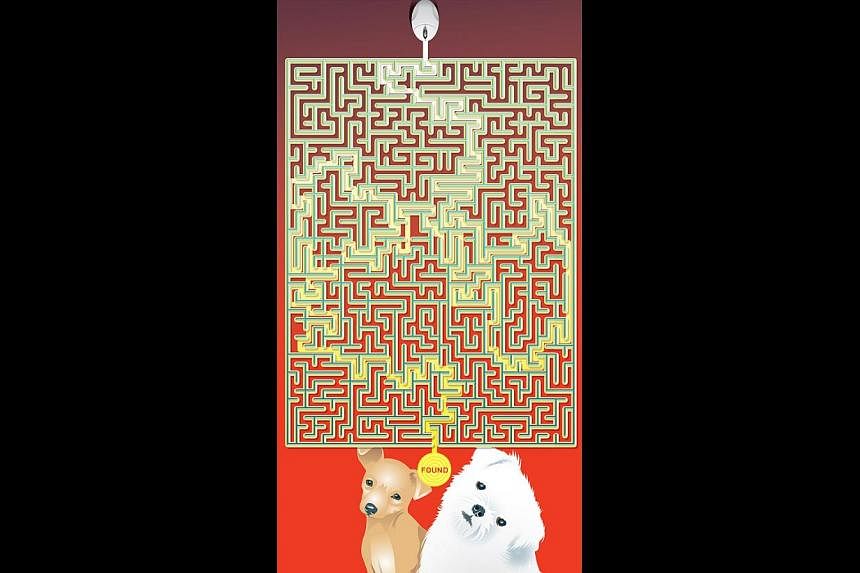Something really nice happened to me last Saturday night.
I was having dinner at a restaurant and while waiting for the food to arrive, took out my mobile phone and started scrolling through my office e-mail.
I did a double-take when I saw the subject header on an e-mail.
It read "Plume and Heidi".
Oh my goodness, I thought, my heart quickening. It can't be.
But it was.
Plume and Heidi are alive!
The sender of the mail, a young man living in London, told me that he and his mother had just read on the Internet a column I'd written almost exactly a year ago. It had appeared in this space on March 2, 2014, and was about two dogs I had been following on Instagram - Plume, a teacup maltese, and Heidi, a chihuahua.
They were adorable.
Plume had a fluffy little face and photographs always showed her with a tilted head. Heidi was a short-haired chihuahua with big bat ears. She had been rescued by Plume's owner (the man's mother), who had found the puppy inside a parrot cage in the Caribbean.
The dogs became the best of friends and led an exciting life. Photos showed them flying from England to Switzerland and the Caribbean. They posed in private jets, on beaches and atop vintage cars.
But after a while, there was nothing. No new images were uploaded onto their Instagram account. Weeks turned into months.
As I wrote in last year's column, I got increasingly worried about the dogs (and their owner). Did something bad happen? How could I find out?
All these months, though, I kept their account on my Instagram feed. I always felt a little sad whenever I saw it.
The sender of the e-mail said that they had unfortunately lost access to Plume and Heidi's original Instagram account, but have since started a new one called @plumeteacup_heidi.
"By the way," he added, "the dogs are doing great!!"
Now, I've never met the dogs and never will, but the news made me so happy.
Plume and Heidi are alive and well!
They are still doted on by their owner!
How great is that?
I was beaming away at my phone.
When I got home, I e-mailed the man to thank him for giving me the update. He wrote me a nice reply.
I've since started following Plume and Heidi's new Instagram account and their mother has also started following the one I have for my dogs.
That's the wonder of the Internet, isn't it? It connects strangers whose paths would otherwise never have crossed, and sometimes nice things happen.
Like my niece and nephew.
Without the Internet, they wouldn't exist.
My sister and her husband met on the Internet 20 years ago, and my niece and nephew must be among the oldest Netconceived babies around.
My sister went onto the Internet around 1995. Those were early days of the world wide web, especially in Singapore.
According to an article by Ernie Quah Cheng Hai which I found on (where else) the Internet, the network first appeared in Singapore in 1991.
The National University of Singapore and the National Science and Technology Board had set up the Technet Unit, the country's first Internet service provider.
Access was limited to R&D organisations, to help them communicate with their counterparts around the world.
By 1993, more had started asking for access and by 1994, 50 organisations including schools were on it. In August 1995, the first Government websites were launched.
By then, my sister, a teacher, had somehow connected with Phill, a computer programmer living a world and terabytes away in Alabama in the United States.
Their romance was through e-mail (quaintly known as electronic mail in those days), snail mail and the phone.
She went over to visit him, he came over to visit her and by March 1996, they were married and she was off to the United States. My niece was born the following year.
People of my niece and nephew's generation have no clue what a world without the Internet is like.
I, on the other hand, grew up in a very different time.
There was no e-mail, no Skype, no IM, no Whatsapp, Snapchat, Wechat.
If we wanted to check a fact (what's the exact value of pi?), we had to troop down to a library and find a book that might - hopefully - have the answer.
If we wanted to research a country we hope to visit, it was another trip to the library or store for a guidebook.
"Friends" referred to people we actually knew and saw face-to-face. People had, at most, a few dozen.
Shopping meant actually going to a shop to make a purchase.
"News" was something you found out about the day after it happened, in a newspaper.
I don't miss those days, not really. Much of cyberspace is wonderful. Life is so much easier now because many things are just a few clicks and scrolls of a device away.
But a lot of the Internet is also bad - think the messages of hate and images of horror being spread by certain groups using the Web.
The Internet has also given us so much information that we are losing the ability to think through things for ourselves. I am wasting a lot of my life consuming junk information.
The Internet also proves that we are all nasty and brutish by nature.
It gives everyone the freedom and tools to post whatever he wants and to do it behind the shield of a computer.
This power has unleashed armies of bullies, trolls and haters, people who find joy spewing venom and knocking others down in public forums, just for the sake of it.
On this score, I look back with longing at the pre-Internet days when our basic instincts were at least kept in check.
American journalist Susan Orlean wrote: "Sometimes, the Internet can feel like a middle-school playground populated by brats in ski masks who name-call and taunt with the fake bravery of the anonymous. But sometimes - thank goodness - it's nicer than real life."
For me last Saturday, it was the latter and it restored my faith in why the Internet can be a positive force.
Thank you, little Plume and Heidi.
Follow Sumiko Tan on Twitter @STsumikotan


